Short Book Reviews
Hanna Kryszewska, Poland
Hanna Kryszewska is a teacher, teacher trainer, trainer of trainers. She is a senior lecturer at the University of Gdańsk, and EU Teacher Training College where she trains pre-service teachers. She is co-author of resource books: Learner Based Teaching, OUP, Towards Teaching, Heinemann, The Standby Book, CUP, Language Activities for Teenagers, CUP and a course book series for secondary schools: ForMat, Macmillan. She is also co-author of a video based teacher training course: Observing English Lessons. Hania is a Pilgrims trainer and editor of HLT Magazine.
E-mail: hania.kryszewska@pilgrims.co.uk
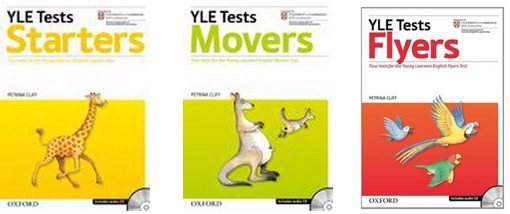
YLE Tests: Starters, Movers and Flyers (with teacher’s booklet). Oxford University Press. Petrina Cliff f (2006, 2006 and 2010 respectively). ISBN 978-0-19-457739-4, pp72, ISBN 978-0-19-457719-9, pp.93, ISBN 978-0-19-457724-3, pp.95 .These three books contain practice tests for young learners preparing for the Cambridge ESOL young learners exams. Each book contains four complete practice tests. They closely replicate the actual exam papers in terms of content, level and layout. They are based on the revised exam syllabus and they offer ample exam practice. At the end of each book there is a vocabulary list. However, it is slightly different from the official booklet, and does not contain the structure list. Fortunately, it is easy to look up the official lists and will find more information at e.g.:
www.teachers.cambridgeesol.org/ts/digitalAssets/116613_YLE_Handbook_2010.pdf
or
www.britishcouncil.org/yle_word_list.pdf.
Each book comes with a CD with recordings of the listening papers and the teacher’s book with an introduction to the exam, tips for the listening, reading and writing and speaking papers. In the TB books there are also revision tips and practical tips for the day of the exam , and of course the answer key to all the papers. Finally, there is a sample script of the oral exam, on which teachers can easily model when giving mock exams. The exam papers are a must for every teacher of YL, even if they do not prepare their students for YLE tests. These test are also helpful models of how to construct our own tests to assess and test young learners.
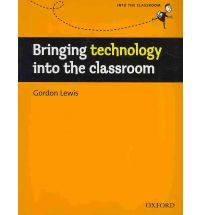
Bringing technology into the classroom. G. Lewis (2009) OUP. ISBN 978-0-19-442594-0, pp 96. This book is probably the first publication in the new OUP series: Into The Classroom. It is different from the old well established OUP series: Resource books for teachers. It is more snappy than the old series. The books in the series are short practical guides aimed at teachers of 6-16 year olds who want to explore new teaching tools and techniques, or to become familiar with new educational policies and ways of implementing them in the classroom. The title in question focuses on how to use the wide range of new technologies available to EFL teachers. The book first deals with IT literacy and potential danger zones like Internet security. Then it moves on to off-line tools such as web processing tools and interactive whiteboards. On-line tools such as e-mails, chats, text messaging, and, of course, the world wide web are also dealt with. The book ends with advanced on-line tools such as blogs, wikis, podcasts, digital portfolios and social networks. Basically, it covers similar areas as other books on this subject available on the ELT market. What is different about it, is that the book is concise, very accessible, and encourages the reader to use the new tools. This approach and tone are ideal for less experienced teachers who want to use more technology in language teaching.
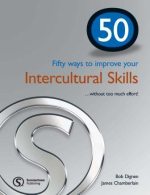
Fifty ways to improve your Intercultural Skills. B. Dignen with J. Chamberlain. (2009) Heinle CENGAGE Learning. ISBN 978-1-902741-85-7, pp175. The book belongs to the highly successful series 50 ways to improve your… . It is mainly aimed at teachers who teach business people but I am sure it can be easily adapted to teaching adult professional in other fields. The main focus is intercultural skills in professional contexts. Through working with the activities in this book the learners will become more successful in meetings, will be able to work in international teams or become leaders of such teams. The activities in the book fall into the following sections: understanding culture, understanding yourself, listening effectively, getting your message across successfully, communicating for international business, building relationships, working in international teams, international leadership and genre specific language. The authors, who are real professionals in their field, draw on the wealth of experience they have to make the book relevant, engaging and different from similar publications on the market. The book comes with an audio CD with listening material and is complete with a transcript of the recordings at the end of the book.
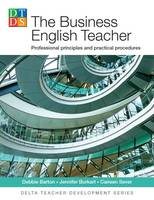
The Business English Teacher. D. Barton, J. Burkart and C. Sever (2010) Delta Publishing. ISBN 978-1-905085-34-7, pp 120. The book belongs to the highly successful Delta Teacher Development Series. It deals with different aspects of successful business English teaching. It has been written by experts with a wealth of experience in delivering business English courses and developing materials. The authors have good knowledge of the business world and the learner who may be a practising or future professional. The book is suitable for teachers who want to take up teaching business English or it may be an inspiration for those who have been in the field for many years. The book falls into three parts: introduction, activities and ideas for further development. The authors are very informative and map out the field very well. The ideas and activities are very creative at the same time dealing with predictable topics such as: the language of business (telephoning, e-mailing etc.), situations in which a business person might use English (presentations, financial statements etc), learner training, grammar and subject specific vocabulary. The book is an excellent supplement to any business English course, it is a training course in itself, ideal for teachers who want to get The Certificate in Teaching English to Business People.
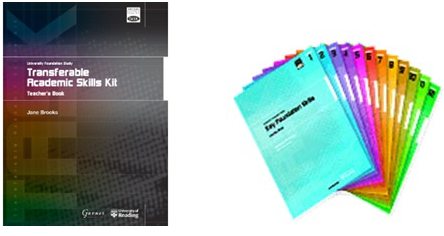
Transferable Academic Skills Kit – 12 essential steps to academic success. A. Manning, L. Norris, C. Nukui, F.McGarry, E. Wilding, A. O’Cain, A. Fava-Verde, J. Brooks, F. Russell, P. Harvey, P. Griffiths and R. De Witt. (2007) Garnet Education, University of Reading. ISBN 978185964927-5, pp between 26 and 42 ( depending on the booklet). This is a very interesting publication created by members of the academic staff of the International Foundation Programme at the University of Reading. The aim of the material is to meet the educational needs of international students who come to study in the UK. The material consists of 12 booklets devoted to various subjects: Key Foundation Skills, Academic Culture, Seminars and Tutorials, Team Working, Problem Solving, Critical Thinking, Introduction to IT Skills, Essay Writing, Scientific Writing, Research and Referencing, Presentations, Examination Technique. The materials can be followed as a complete course or, alternatively, individual modules. There is no focus on one concrete academic area or discipline; the topics come from different fields and therefore are ideal for a foundation course at university or a CLIL course in secondary education preparing for subsequent university courses in English. The level of English is not very high, B1/B2, so it may not be suitable for pupils or students whose level of English is higher and who are more sophisticated.

Please check the Methodology and Language for Primary Teachers course at Pilgrims website.
Please check the Certificate in Teaching English to Business People course at Pilgrims website.
Please check the Basic IT in the Classroom course at Pilgrims website.
Please check the Using Technology in the Classroom – Level 2 course at Pilgrims website.
Please check the Teaching Advanced Students course at Pilgrims website.


|